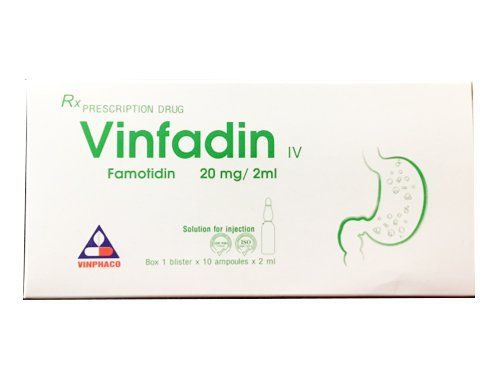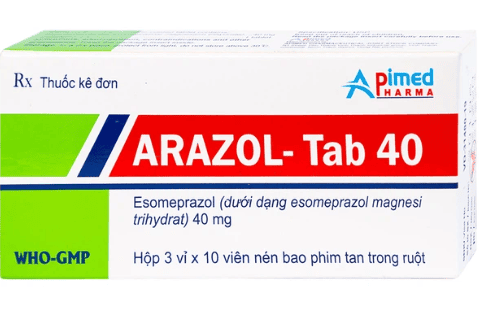This is an automatically translated article.
Rabaris is a prescription drug, containing the main ingredient is Rabeprazole sodium 20mg, in the dosage form of enteric coated tablets. Patients can follow the article below to know what drug Rabaris is? Dosage and how to use?
1. Indications of the drug Rabaris 20mg
Indications for the use of Rabaris in the treatment of:
Gastric - duodenal ulcer disease. Gastroesophageal reflux disease. Cases that do not respond to drugs acting on H2 receptors. Zollinger-Ellison syndrome. Treatment of gastric and duodenal ulcers caused by HP bacteria. In this case, it should be combined with other antibiotics.
2. Contraindications of the drug Rabaris
Patients should not use Rabaris for treatment if they are hypersensitive to any of the ingredients in the drug.
3. Dosage and how to take Rabaris
How to use: Rabaris drug is taken orally. Rabaris tablets should be swallowed whole by the patient. Chewing, breaking, or crushing Rabaris can increase side effects when taken by mouth. During treatment with Rabaris, the patient should not use stimulants such as: Alcohol, beer, coffee or smoking, .... Limit staying up late and should not eat hot spicy food.
Dosage:
In the treatment of peptic ulcer disease in adults: 1 tablet/time/day, after breakfast. Treatment within 1-2 months. In the treatment of gastroesophageal reflux disease in adults: 1 tablet/time/day. Treatment for 1-2 months, if the disease has not improved, can be used for another 2 months. In the treatment of Zollinger - Ellison syndrome in adults: 3 tablets/time/day or as directed by a doctor. In the treatment of gastritis - duodenal ulcer caused by HP bacteria: This case needs to be combined with other antibiotics, so it should be used according to the doctor's regimen. Note: Rabaris dosage above is for reference only. The specific dose of Rabaris will depend on the condition and the progression of the disease. To get the right dose of Rabaris, patients need to consult their doctor.
4. Side effects of the drug Rabaris
At therapeutic doses, Rabaris is well tolerated. However, the process of using Rabaris, patients may still experience side effects such as:
Body fatigue; Soreness; Fever; Sensitivity to light; Rash; Itching and burning; Insomnia; Headache ; Dizziness; Dizzy; Nausea; Diarrhea ; Constipation; Flatulence; Dry mouth; Anorexia; Inflammation of the mucous membranes of the mouth or gastrointestinal tract. If you experience these symptoms, the patient should stop using Rabaris and notify the doctor for appropriate treatment.
5. Drug interactions Rabaris
Rabaris may have an interaction reaction if used concurrently with:
Azole antifungals such as: Fluconazole, Ketoconazole; Digoxin drug. To avoid interactions, before being prescribed Rabaris, patients should inform their doctor about the drugs they are taking. The doctor will base it on that to prescribe the appropriate Rabaris.
6. Be careful when using Rabaris
Use caution when using Rabaris for people with liver and kidney disease because the drug is mainly metabolized in these parts. Do not stop taking Rabaris suddenly. If you want, you have to reduce it gradually before stopping completely. If you want to use Rabaris for children, you should consult your doctor. Use caution when administering Rabaris to pregnant and lactating women. Absolutely do not use when Rabaris medicine has signs of discoloration, mold, watery or expired. Above is all information about Rabaris drug, patients need to carefully read the instructions for use, consult a doctor / pharmacist before using. Absolutely do not arbitrarily buy Rabaris medicine at home because there may be unwanted side effects.
Please dial HOTLINE for more information or register for an appointment HERE. Download MyVinmec app to make appointments faster and to manage your bookings easily.













